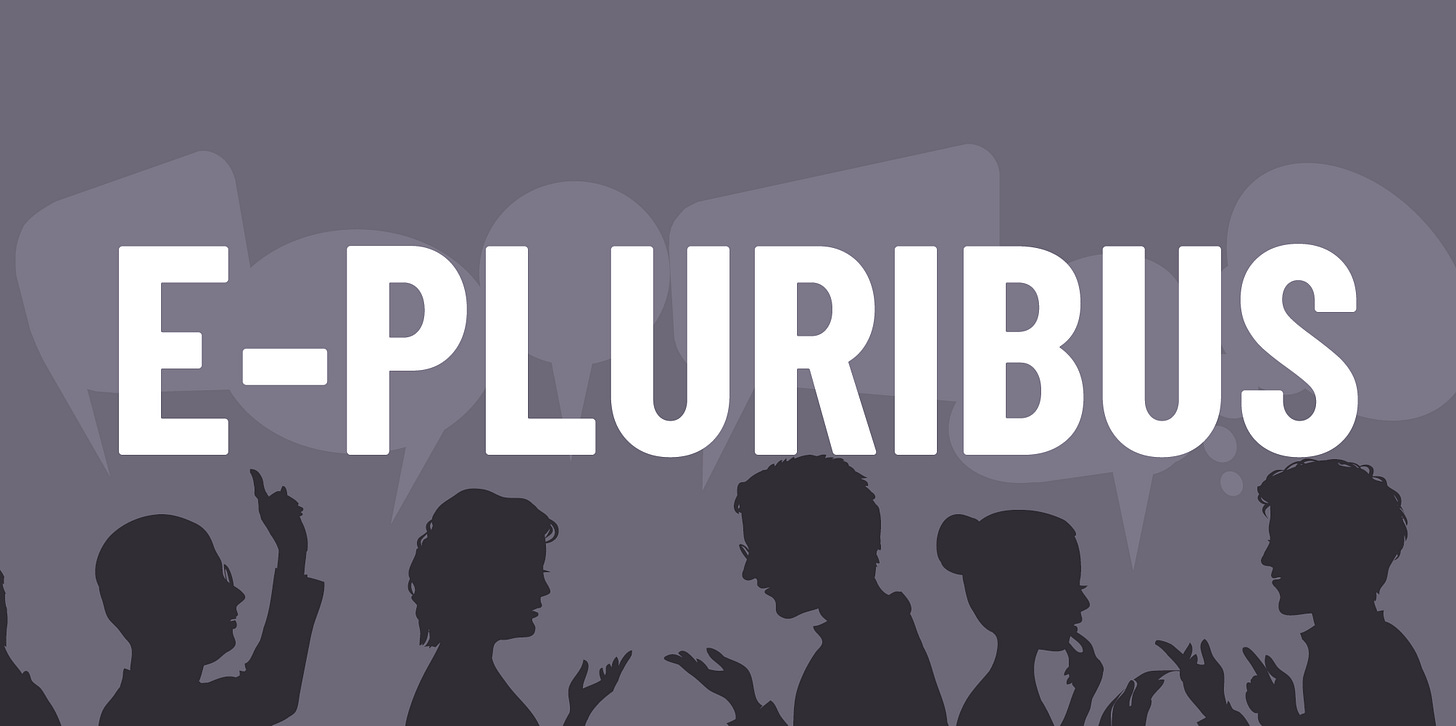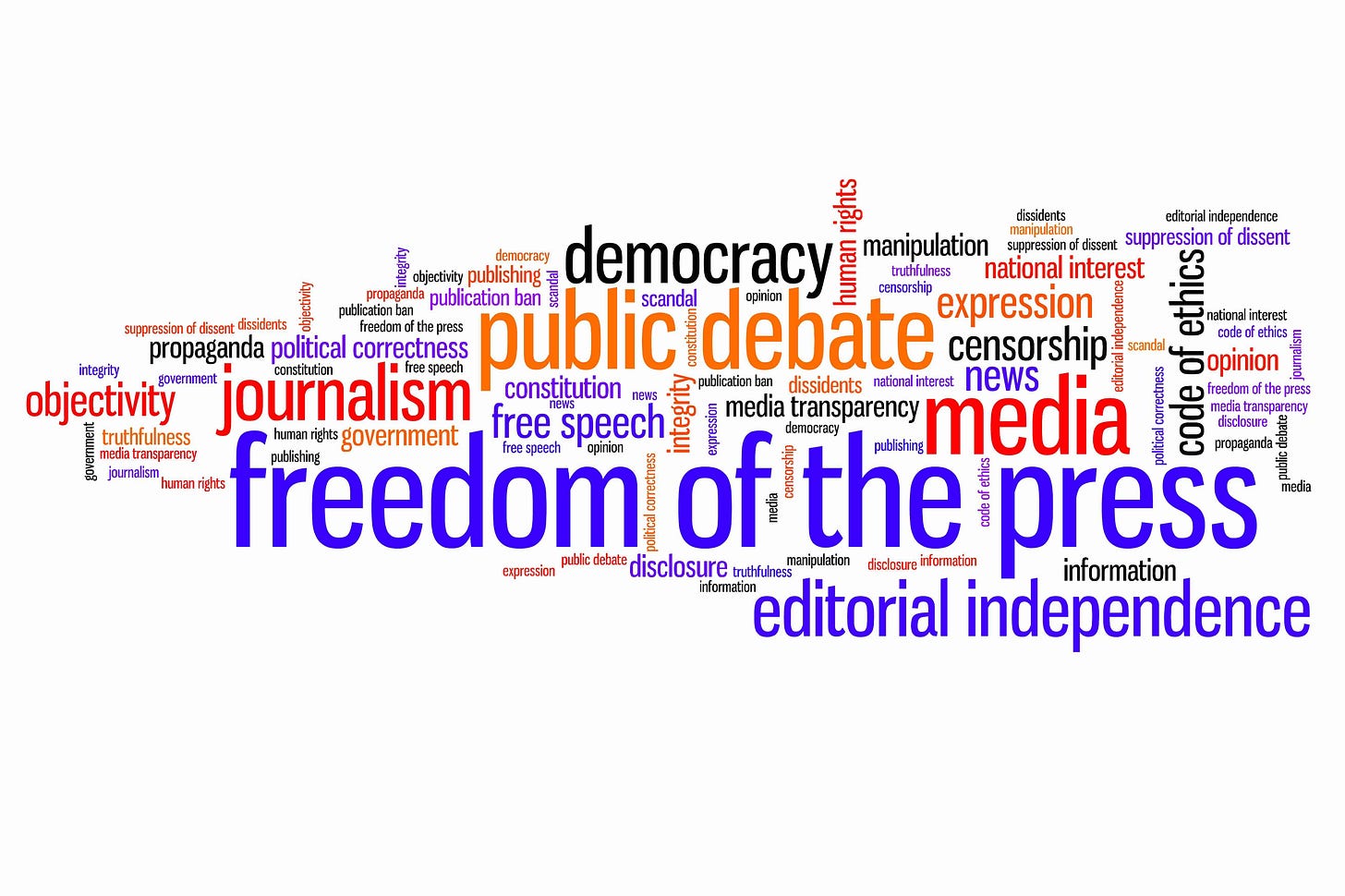E-Pluribus | July 21, 2021
Going deeper on CRT, the Biden administration's war on misinformation (and free speech), and a positive move for the freedom of the press (plus a bonus side note).
A round up of the latest and best writing and musings on the rise of illiberalism in the public discourse:
William A. Galston: A Deeper Look at Critical Race Theory
Building off an earlier column, William A. Galston at the Wall Street Journal digs deeper into the origins and implications of Critical Race Theory (CRT). Galston asserts that CRT not only denies equality of opportunity and the possibility of true objectivity, but even undermines some of the achievements and underpinnings of the civil rights movement.
• Critical race theory denies the possibility of objectivity. As the volume’s editors state in their illuminating introduction, “Scholarship about race in America can never be written from a distance of detachment or with an attitude of objectivity. . . . Scholarship—the formal production, identification, and organization of what will be called ‘knowledge’—is inevitably political.” And politics is about power—specifically, about the struggle between those who seek to maintain oppressive hierarchies and those who seek to overturn them. Scholarship can be a powerful weapon in that struggle.
[…]
• The theory offers a fundamental critique of the civil-rights movement and the liberal ideology it reflects. Such theorists argue that the civil-rights movement scored some “symbolic” gains for black Americans but left their material conditions mostly unchanged, in part because civil-rights law is inherently limited. Such laws treat “discrimination” as isolated acts by specific individuals or businesses, as exceptions to prevailing norms and practices, not as pervasive and “systemic.” Civil-rights law can mitigate the consequences of illegal and unjust acts, but it can do nothing to redress the continuing impact of past oppression.
• Critical race theory rejects the principle of equality of opportunity. Its adherents insist that equality of opportunity is a myth, not a reality, in today’s America, and that those who pursue it are misguided. The real goal is equality of results, measured by black share of income, wealth and social standing. Critical race theorists reject the idea that sought-after goods should be distributed through systems that evaluate and reward “merit.”
This metric is unacceptable, the editors say, because certain “conceptions of merit function not as a neutral basis for distributing resources and opportunity, but rather as a repository of hidden, race-specific preferences for those who have the power to determine the meaning and consequences of ‘merit.’ ” These critics don’t specify which conceptions of merit, if any, they would find acceptable.
For those who reject meritocracy and demand equal results, even race-conscious policies such as affirmative action are diversionary. “The aim of affirmative action,” the book’s editors insist, is to “create enough exceptions to white privilege to make the mythology of equal opportunity seem at least plausible.” Such policies are an inadequate response to the persistence of “white supremacy.”
Read the whole thing.
Jacob Sullum: Biden Charges Facebook With Homicide, While His Surgeon General Recommends 'Legal and Regulatory Measures' To Suppress COVID-19 'Misinformation'
At Reason, Jacob Sullum reports on the Biden administration’s latest salvos in its battle with social media giants and “misinformation” [see item #1 in yesterday’s e Pluribus round up]. With the surgeon general pushing “appropriate legal and regulatory measures” and President Biden appearing to accuse Facebook of “killing people” (though he later said it was the misinformation itself he was referring to, not Facebook,) Sullum notes the vague and broad range of what could be considered misinformation and the clear threat to free expression. If free speech does not protect controversial opinions, it’s not much of a protection.
The day after Surgeon General Vivek Murthy issued an advisory calling for a "whole-of-society" effort to combat the "urgent threat to public health" posed by "health misinformation," President Joe Biden accused Facebook and other social media platforms of "killing people" by allowing the spread of anti-vaccine messages. Bridling at the homicide charge, Facebook noted that "vaccine acceptance" among the platform's users has increased by 10 to 15 percentage points since January.
[…]
The escalation of Biden's tiff with Facebook reflects his frustration with the company's failure to control speech the way he thinks it should. As Reason's Robby Soave noted last week, Biden seems to think Facebook should be treating his censorious suggestions as orders. "These platforms have to recognize they've played a major role in the increase in speed and scale with which misinformation is spreading," Murthy said on CNN yesterday. His recommendations include "appropriate legal and regulatory measures that address health misinformation while protecting user privacy and freedom of expression."
It is hard to imagine how any such measures could be "appropriate" in light of the First Amendment. The basic problem Biden and Murthy have identified is that freedom of speech allows people to say things that are misleading or flat-out wrong. And while Biden and Murthy are surely right that misguided opinions and erroneous statements of fact can have bad consequences, that has always been understood as an unavoidable cost of free speech.
Read it all here.
Stephen J. Adler and Bruce D. Brown: The Press Just Got a Big Win. Let’s Make It Permanent.
In the New York Times, Stephen Adler (formerly) of Reuters and Bruce Brown of the Reporters Committee for Freedom of the Press cheer Attorney General Merrick Garland’s new policy to limit his Justice Department’s ability to obtain notes and other records from journalists. However, they argue that to prevent a future administration from simply reimposing the old rules (or even more invasive ones), Congress should codify the regulations to make them permanent and thus protect reporters’ ability to hold the government to account without fear of reprisal.
After decades in which federal prosecutors took steps to try to unmask confidential sources who speak to reporters, Attorney General Merrick Garland on Monday largely removed that threat and enhanced the free flow of information to the public. It’s not an overstatement to say that the new rule will increase transparency about the government’s own workings, rather than allow them to be cloaked in secrecy.
When sources fear that their confidences may be compromised by law enforcement — even if actual seizures of records are relatively rare — they may decline to come forward, leaving the public in the dark about vital issues. That’s why the new rule, which replaced a policy that was more favorable to the purposes of law enforcement, is so important to the press and the public.
Nonetheless, uncertainty hangs over the new policy: It is an internal rule, and it can be changed under any subsequent attorney general. With the country’s political direction up for grabs in 2022 and 2024, it is time for Congress to enhance the public’s right to know by turning the Justice Department rule into federal law.
Read it all.
Side Note:
Politico reported this week on a new center at the University of California-Irvine School of Law focused on free speech and elections:
“American democracy is under increasing strain, and the 2020 election exacerbated threats to the rule of law and to public confidence in fair elections,” [Rick] Hasen said in a statement. “Much of that is thanks to the rise of social media. The new [Fair Elections and Free Speech Center] will look at what’s wrong, and what can be done, to strengthen democratic institutions in the U.S. and around the world.”
While Pluribus applauds the sentiment, we noticed a curious statement in the center’s description of its work (highlighted below):
Established in 2021 after the contentious 2020 U.S. Presidential elections, which culminated in the dangerous January 6, 2021 insurrection in the United States Capitol, the Fair Elections and Free Speech Center at UCI Law is unique in its focus among U.S. and global institutions. It is dedicated solely to advancing an understanding of, and offering means to counter, threats to the stability and legitimacy of democratic governments exacerbated by the unregulated growth of digital media and other technological changes in mass communication. The Center will facilitate deep scholarship on American law, politics, and democracy as well as on global norms and institutions.
While the growth of “digital media” (the press) presents challenges to be faced and overcome, characterizing the explosion of communications technology as a “[threat] to the stability and legitimacy of democratic governments” seems overwrought. While more avenues for free expression can be messy, in the end, it is suppression and control of speech that are the real threats to democracy.
Around Twitter
Rich Lowry with a long thread explaining the dishonest portrayal of proposed education legislation in Texas regarding the KKK:
Wesley Yang on the Left’s shift on free speech and civil libertarianism:
Finally, hopefully everyone can agree that sometimes Twitter makes the right call on suspensions:











